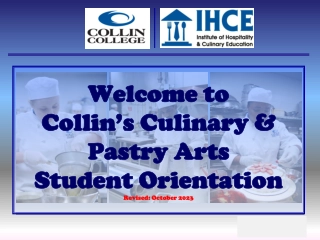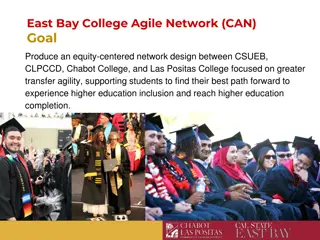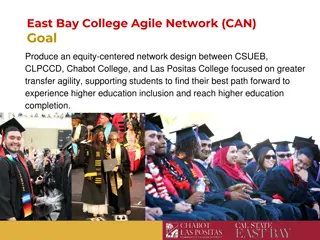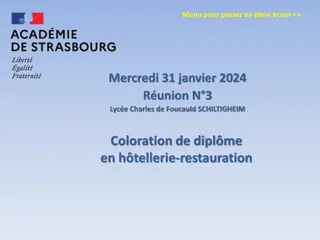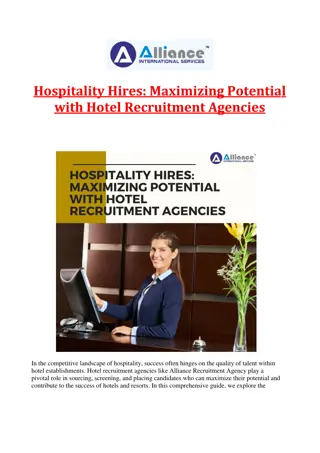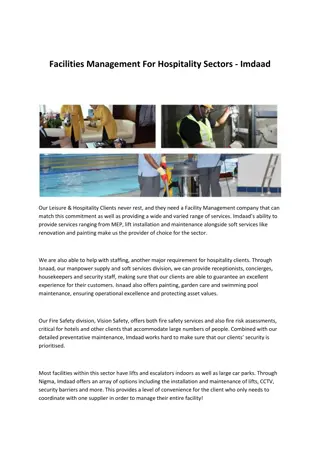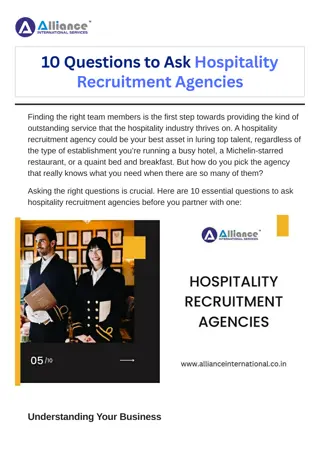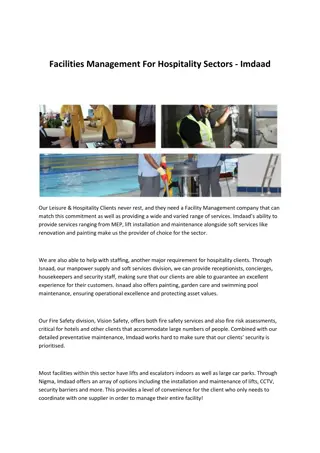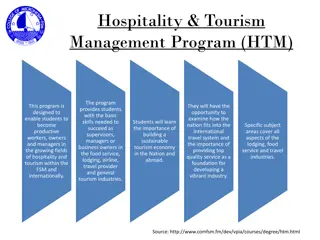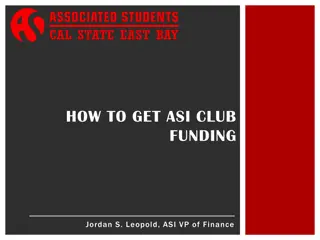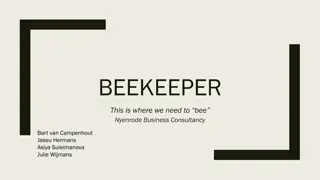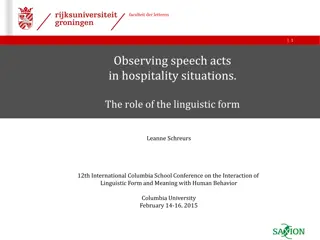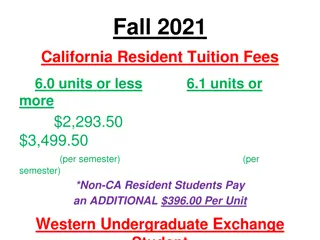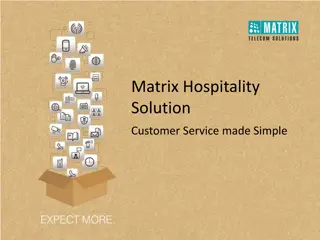CSUEB Hospitality Policy Overview
This overview provides information on the Hospitality Policy at CSUEB, applicable to all hospitality expenses regardless of funding source. It outlines the criteria for hospitality expenses, examples of approved activities, meeting examples covered under the policy, and expenditure limits per person. The policy emphasizes the necessity for expenses to be reasonable, serve a business purpose, and align with CSUEB's mission.
Download Presentation

Please find below an Image/Link to download the presentation.
The content on the website is provided AS IS for your information and personal use only. It may not be sold, licensed, or shared on other websites without obtaining consent from the author. Download presentation by click this link. If you encounter any issues during the download, it is possible that the publisher has removed the file from their server.
E N D
Presentation Transcript
Welcome Maureen Pasag, Associate VP, Financial Services Topics Hospitality Policy Sai Vang, Director Procurement Services Tammy Heard, Accounts Payable Technician II Chartwells Catering Paul Chan, Sr Catering Director Assessment Management Process - Tom Poon, AVP Risk Mgmt & Internal Control Gene Lim, Deputy Chief Information Officer Announcements Virtual Terminal Payments Aaron Ledesma, Assoc. Director Student Financial Services Closing Maureen Pasag
Y U INCLUDED FINANCE Hospitality Policy CSUEB effective date August 2023 Sai Vang & Tammy Heard
Who does the policy apply to? Applies to all hospitality expenses regardless of funding source and payment method: CSUEB Campus Oakland Center Concord Campus Auxiliaries (ASI, Foundation and Ed Foundation)
What is a Hospitality expense? Hospitality expenses are necessary, appropriate to the occasion, reasonable in amount, and serve a business purpose consistent with the mission and fiduciary responsibility of the CSUEB. Expenses that relate to an official CSUEB business event Activities that promote CSUEB to the public When an employee acts as an official host: Occasion must serve a clear business purpose No personal benefit derived by the host or other employees The approving authority must evaluate the importance of the event in terms of costs, benefits to be derived, and any alternatives that would be equally effective.
Hospitality Examples When CSUEB . . . Hosts or sponsors a business meeting Hosts official guests with an interest in CSUEB Hosts or sponsors a meeting of a learned society or professional organization Hosts receptions held in connection with conferences, meetings of student organizations, and student events such as commencement
Hospitality Meeting Examples Academic Senate Campus meetings of deans and directors or department Employee morale functions Formal training sessions Student Clubs Events/meetings occurring more than once a month are not permitted under this policy.
Hospitality Expenditures Food maximum per person rate (includes food, beverage, labor, all tax, delivery fees, tips, etc): Breakfast: $40 Lunch: $55 Dinner: $85 Light Refreshments: $30 Our on-campus caterer, Chartwells, has the first right of refusal for orders totaling $250 or more.
Hospitality Expenditures (contd) Awards, Prizes, and Cash Equivalents Pre-approvals are required via Hospitality Justification Form Supporting documentation is needed Clear description of award program and business purpose Eligibility requirements List of recipients and relationship to CSUEB Cash equivalents not to exceed $25 per recipient per event Non-cash awards and prizes not to exceed $50 (including tax and shipping) per recipient per event
Hospitality Expenditures (contd) Gift Cards: All gift cards must be: Secured properly, such as in a locked drawer or safe Maintained by an ongoing inventory of issuance and distribution which may be subject to audit Gift cards may affect a student s financial aid or an employee s W-2 Gift cards for employees are reported to payroll
Unallowed Expenditures Hospitality expenses that are of a personal nature and not related to the active conduct of official CSUEB business, such as: Birthday celebrations Weddings/Anniversaries Funerals Baby showers Parties
Funding Sources State Funds May be used to pay for awards and prizes to employees for exceptional contributions, to students for excellence, and individuals to participate in a research-funded survey or study. May be used for employee recognition, official presentations for length of service awards, or exceptional contributions with at least 5 years of service. Allows for official employee morale-building and appreciation activities that serve a clear business purpose.
Funding Source Unable to use State Funds For any expenditure prohibited by applicable laws, regulations, or agreements including the California Budget Act To pay for alcoholic beverages or memberships in social organizations Local trust agreements (LTA) must be on file when expenditures vary from the standard restrictions (this would apply to a PRxxx fund).
State Funds Include some of the following funds: EB001, PRxxx, PExxx, PLxxx, PVxxx, PUxxx, and PTxxx funds State funds are those State University Trust funds that are continuously appropriated by the legislature (EC 89700-89726)
Hospitality Justification Form All hospitality expenses must have a completed Hospitality Justification Form (located in AdobeSign) submitted along with supporting backup documentation. Information required on the justification form includes: Type of event (department meeting, host of official guest, etc.) If the meeting is reoccurring. The business purpose of the meeting or event. Type of hospitality (meals/refreshments, service recognition, etc.) Location and date(s). List of attendees and their business relationship to the campus. The cost of the meal per attendee. For a large group where the names of attendees are unknown, a description of the group and estimated cost of the meal per attendee is sufficient.
Hospitality Justification Form (cont) Approving Authority Any department providing hospitality must have the expenditure approved by the delegated approval authority. The individual making the order/purchase may not also approve. Individuals with delegated approval authority may not approve their own expenses and individuals may not approve expenses of their supervisor. The exception is approval of the President's expenditures by the Chief Financial Officer. Payment or reimbursement of hospitality expenses for recreational, sporting, or entertainment events be approved by the President or their designee. Payment or reimbursement of hospitality expenses for a spouse/domestic partner/significant other of an employee be approved by the President or their designee.
Procedure Obtain quote(s) Complete Hospitality Justification Form Purchase Method: 1. 2. 3. PCard or Reimbursements: Attach Hospitality Justification Form and supporting documentation in Certify (Process by Accounts Payable) Purchase Order: Attach completed Hospitality Justification Form and supporting documentation to requisition (Processed by Procurement Services)
Additional Information Acknowledgement of Receipt Form located in the AdobeSign Link to the Accounts Payable web page: https://www.csueastbay.edu/accounting-fiscal/accounts- payable.html CSUEB Hospitality Policy can be found in the CSUEB Policy Library: https://csueastbay.policystat.com/policy/14263671/latest
Thank you! Questions?
Y U INCLUDED FINANCE Chartwells Catering Paul Chan
In order to streamline and develop more environmentally friendly processes, staff from Student Affairs, Accounts Payable (AP) and Chartwells teamed up to develop a new catering invoice payment process, effective January 2020.
Department Process Department Process Department places the order through the Chartwells Pioneer Catering system. The following information will be captured: Chartfield String Approver (cannot be the same person who places the order and must follow Delegation of Authority) List of attendees (either attach a list or the email invite/flyer which has names of attendees) List of attendees (either attach a list or a flyer of the event with names of attendees) List of attendees - either key into system or attach list (or a flyer of the event) with attendee information Hospitality Justification Form will also need to be attached Note: It is important that the information entered is accurate to avoid processing delays. The Chartwells Pioneer Catering system will automatically route the catering request to the approver. Upon approval, Chartwells will begin to work with the department on the event.
AP Process AP Process After the catering event, the approved invoice will be electronically submitted to AP. AP will review the chartfield string, approver name and attendee information. AP will process the catering invoices after a three-day waiting period. With this new process, there is no longer a need to route a printed catering invoice to the originating campus department.
If an Invoice Needs to be Revised If an Invoice Needs to be Revised Department must notify AP within three business days after the event to pull the invoice. Department must immediately contact Chartwells so that an updated invoice can be issued. o In this case, the updated invoice will be routed manually to the campus department. The campus department will need to record the chartfield string on the paper invoice, approve the invoice and attach the attendee information and send to AP Department for payment processing. If you have any questions, please contact Martin Castillo, Associate Vice President, Campus Life at 5-3601 or Mark Almeida at 5-4376.
Grant Fund Process Grant Fund Process The PI and ORSP approvals are only for orders charged against grant funds. The grant funds are the funds that start with a "W", accompanied by a 6-digit project code that also starts with a "W". The form should include the approval email addresses from: (1) the department's approver who has delegation of fiscal authority; (2) the PI who oversees the fund, and (3) ORSP (Jennifer Cabrejas). The order placer would be able to get this information from their department's budget person. Here's a sample of a correct order for a grant fund:
Y U INCLUDE FINANCE Asset Management Process Tom Poon & Gene Lim
Assets Assets In accordance with CSU Policy titled Administration of University Property, certain property that is used for Cal State East Bay business must be tagged, tracked and inventoried by Property and Asset Management office. Capitalized equipment Unit cost $5,000 or more Non-capitalized equipment (excluding computer devices) Unit cost $2,500 - $4,999 Easily subject to theft or loss Computer devices, regardless of cost, are tagged, tracked and inventoried by Information Technology Solutions.
ITS Asset Tracking ITS Asset Tracking Revision to the asset tracking process includes: Tighter integration with device management tools for devices in the field Revised process on device reporting and review Extension of device check-in to outside the campus network Data encryption extended to devices, most likely to whole campus at some point eWaste process still pretty solid and unchanged at this time
Roles and Responsibilities Roles and Responsibilities Faculty and Staff Faculty and Staff obligation to safeguard University equipment by: Taking reasonable security precautions to discourage loss, theft or misuse Preventing disclosure of protected data Reporting missing, lost, stolen or vandalized property Missing Items Report o Stolen equipment must be reported to UPD if on campus, or local authority if off-campus Providing reasonable care, maintenance, and use of equipment to prevent damage Returning equipment in satisfactory condition
Roles and Responsibilities Roles and Responsibilities Departments Departments Ensuring that all purchased property is delivered to shipping and receiving Notifying the Property and Asset Management office of/to: o Inter-department property transfers Property Transfer Form o Loan University equipment Property Custody Receipt o Missing asset/equipment Missing Items Report o Dispose of equipment Property Survey Report Assisting the Property and Asset Management office in: o Annual tracking of department inventory o Physical inventory process
Questions www.csueastbay.edu/riskmanagement/support-services/ Dayrll.lewis@csueastbay.edu 510-885-2120
Y U INCLUDE FINANCE ANNOUNCEMENT COMING SOON! Virtual Terminal Integrated Payments Video Overview Aaron.Ledesma@csueastbay.edu
Watch your email inbox for our Online Survey please take a few moments to share your feedback on today s session and your ideas for future sessions! Today s slides will be available in the Finance website under Financial Services Resource Center. THANK YOU FOR VIEWING TODAY S FYI SESSION!






















